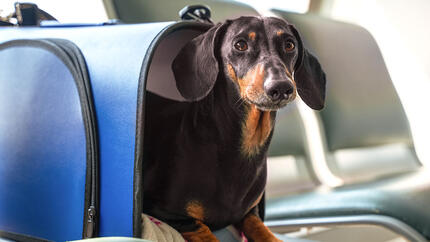
There’s no need for your dog to stay at home if you’re going on holiday – in fact, your dog can make a great travel companion. With so many dog friendly hotels and holidays anywhere in the world, check out the basics of travelling with dogs and the world is your oyster.
Travelling with dogs is easiest if you prepare everything well in advance – accommodation, travel arrangements, and paperwork can all be organised months before you go, which means less stress and more fun for both of you.
Of course, you might not be planning on travelling abroad with your dog, but staying somewhere close to home, in which case things are even easier. Just keeping a few simple things in mind will really increase the ease of taking dogs on holiday. Get your pen ready and make sure you’ve thought about everything in the list below – and when you’ve done all that, the only thing left is to get excited about your trip.
Health and safety arrangements when travelling with dogs
The first thing to keep in mind when travelling with your dog to a new place is your pet’s health and safety. This task alone can make many dog owners reconsider their travelling plans, but it’s actually quite a simple process. Here are a few things to keep in mind.
Go to your vet a few months before travelling with your dog
Especially true for holidays abroad, make sure you discuss your travel plans with the vet 7-8 months in advance to give you plenty of time to comply with any extra requirements.
Vaccinations will need to be up to date and there can also be specific vaccination requirements for the country you are visiting. Keep in mind that certificates might also need to be issued, depending on where you are travelling with your dog.
Dog insurance can be a life-saver
Look for policies that cover emergencies in the likelihood that your dog will need vet care on your trip abroad. Some policies might even contribute to the cost of cancelled holidays or kennel fees if it’s you needing a hospital stay. Check out our full guide for all things dog insurance.
Look for the nearest vet office to your holiday stay
A nearby vet can help with many health enquiries, both big and small. Make sure you jot down the address and contact details of the nearest veterinary practice before you’re travelling with your dog abroad.
Have the basics covered
No matter how you choose to travel, there are a few essential things to keep in mind. Your dog can lose a considerable amount of body water through panting, so take a bowl and lots of bottles of water with you to help them stay completely hydrated.
Remember to pack plenty of plastic bags for when your dog goes to the toilet. After all, even when travelling they have the same needs as usual.
Microchipping
Microchipping your dog is important – many pets go on an unexpected adventure every now and then, and if your dog were to get lost whilst on holiday you’d want the best chance of seeing them returned. This is even more important if you’re going abroad with your dog, as unfamiliar sights and sounds might prompt more excitable pets to get distracted and dash for something!
In fact, if you're going overseas under the Pet Travel Scheme (PETS), it's compulsory that your dog is microchipped. Ask your vet for more details, or read about microchipping your dog in our handy article.
Think of the current life stage and health condition of your dog
All owners want to share their best times with the four-legged family members, but sometimes it’s a good idea for them to skip on the fun stuff, especially when travelling on a plane. If your dog is under 3 months old, a senior, pregnant or ill dog, they are likely to have difficulties coping with the journey. When in doubt, check with your vet for advice.
Dog travel arrangements
Whether you're travelling with your dog by car, plane, train or bus, there are a few things to keep in mind that will make the journey safer and more relaxing for both you and your pet.
- Familiarise your puppy or dog with car travel as early as possible, as this will make any trips away far less stressful. Get them used to the car with treats, toys and lots of encouragement!
- Keep your dog safely contained by using a dog crate or if they have to sit on a car seat, there are special harnesses they should wear that look just like dog seat belts.
- Hold off feeding for two hours before travelling with your dog in the car as a precaution against car sickness. And if your dog is particularly anxious about car travel, check with your vet for their advice.
- Include plenty of stops for long car trips for toilet breaks and a chance to stretch the legs.
- Hot weather is particularly dangerous for a pooch confined to a car trip for hours. Sunshades and even letting the windows open can help. But make sure you don’t let them travel with their head out the window.
For even more puppy car travelling tips check our quick guide.
- Make sure your airline knows you’ll be bringing your dog on the trip.
- Consult the airline or train company about carrier size and requirements, which may differ according to your dog's height and weight. This will help you avoid a last-minute rush!
- Some companies won’t allow dogs to travel in the cabin with you, so make sure you’re prepared to be separated from your pet for the duration of the plane journey. It’s always a good idea to include a feeding schedule and any other relevant information in case your dog doesn’t make it to the destination at the same time as you.
- If your dog isn’t already used to a carrier, take several weeks to introduce it before your trip. Leave it open and available, filled with soft bedding and an occasional hidden treat.
- Put a small tag on your dog’s collar displaying the address at your destination in case you get separated for some reason.
- Before you go on holiday with your dog, particularly by plane, get a check-up with the vet first. Not all pets will be suited to all forms of transport – some may find it too stressful.
If you’re flying with an assistance dog or need more advice on travelling with your dog by plane, check out our in-depth article.
- Whether you're going on holiday with your dog by rail, boat or air, a carrier designed for dog travel is an important accessory, especially if you have a car without a large, secure boot space. Start looking for the perfect one early.
- Check the transport company policy regarding dog travel. Some of them won’t allow you to travel with a pet, while others will include an extra charge. It’s better to familiarise yourself with the rules sooner rather than later.
Accommodation tips when travelling with your dog
Whether you’re holidaying with your dog at home or overseas, there are now many types of dog-friendly hotels and accommodation options to suit every taste and budget.
Your dog might also enjoy dog training holidays, which provide a place where you can enjoy canine activities and sports with other dog lovers under the guidance of a qualified trainer.
Make sure your accommodation is dog-friendly and, if you are staying at someone else's home, check ahead about toilet facilities for your dog.
Remember to think about the presence of other pets (either during travel or at your destination) which might affect your dog’s behaviour. Will your dog want to chase the B&B owner’s housecat, for example, or bark at the dogs they’re travelling with?
Schemes for travelling abroad with your dog
To make things easier for your dog to travel abroad with you, the British government have set up something called The Pet Travel Scheme (PETS for short), which is administered by the Department for Environment, Food and Rural Affairs (DEFRA).
This scheme lets people take their cats and dogs on holiday to a number of other countries, then return them to the UK, all without the need for quarantine. All owners have to do is make sure that certain conditions are met!
These conditions include booking your trip with an approved transport company, using an approved route, and making sure your pet fulfils health criteria – like having a recent blood test and up-to-date vaccinations. In short, travelling with your dog to many places is a lot easier than it once was, saving stress for both your dog and you.
The list of everything you need for the scheme, including approved countries, companies and routes, is updated quite frequently, so check the DEFRA website to get more information or call the PETS Helpline on 0870 241 1710.
Remember, however, that when you go on holiday with your dog some countries still have special conditions for your entry, or require particular documents. And when travelling abroad with your dog, some countries still require a period of quarantine on arrival. Again, DEFRA can help you find out if this applies to you.
Residents of the Republic of Ireland should check the Pet Travel and EU Pet Passport requirements.
Travelling with dogs to the EU after Brexit
With Brexit looming, you’ll need to start thinking about the additional requirements for travelling with dogs to the EU after Brexit. The new process involves you visiting the vet at least 4 months before your travel date, and you’ll need to ensure you complete the following steps:
- Get your dog microchipped if they’re not already
- Vaccinate your dog for rabies – if they already have been, ensure these are up to date
- 30 days after your dog’s rabies vaccination, return to your vet for a blood test to make sure it’s worked
- Wait 3 months after the successful blood test before travelling
- No more than 10 days before travel, go back to your vet to get an animal health certificate (AHC) which must be valid for four months
- Pet Passports will no longer be valid – you will need an Animal Health Certificate (AHC) in order to travel into the EU with your pet
Where travelling with dogs after Brexit may seem like a lot of effort, it’s worth noting that providing your dog’s vaccinations are kept up to date, you won’t need to repeat the blood tests for each journey.
Leaving your dog at home
Of course, not all dogs are completely suited to travel: if they are elderly, ill, or have a history of anxiety during confinement or dog travel, you should consider leaving them at home with a reliable dog sitter or in kennels.
There are lots of care options to choose from whatever your budget, so you’re sure to find something that suits your dog. To help you choose what’s best for both of you, get started by reading about dog sitting and day care.
Whether your dog goes on holiday with you or stays at home, bear in mind what is best for them. As long as they’re happy, your holiday will be a great one!
If you’re thinking of travelling with your dog abroad you will need to consider pet passports, vaccinations and any rules of travel – take a look at our article about taking your dog on a plane if you are venturing further afield!















